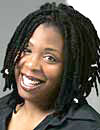Cassandra Handley, author of VF.com’s “A Mormon View” blog, feels the Mormon church has been unfairly criticized since the passage or Prop 8. Vanity Fair published a conversation between Handley and Sue Carswell, representing the L.G.B.T. community, and moderated by Michael Hogan, V.F.’s executive online editor.
Here are few of the more interesting exchanges:
Hogan: But if it’s just about semantics, why is the Mormon church trying to change the constitution of the state of California?
Handley: We have something that we call the Proclamation of the Family that basically states our position on the importance of the family. We value family as being the most crucial institution in the world. And the first statement of that proclamation, which I don’t have memorized, is something along the lines of, We believe that a marriage is between a man and a woman. And then it says something along the lines of, We value procreation so much, and the way that procreation can take place is between a man and a woman.
Carswell: I’m sure there are members of your church who can’t have babies and go through fertility treatments, adoption. The same way that gay couples can and do in their own marriages.
I can’t understand why you would come to my wedding when you say what you just said. I’m not getting a civil union. I’m having a wedding. What’s the difference between the two that I’m not getting here? You would come to my civil union? Of course you would, according to what you’re saying. But you’d also come to my marriage, yet you’re saying that you’re against marriage.
Handley: The thing is, though, if this proposition had not passed, religious groups could have been forced to conduct same-sex weddings. And if they refused, they could have been open to legal action.
Hogan: That’s not really a rationale for changing the constitution of the state to say that same sex-couples shouldn’t be allowed to get married anywhere and that a bunch of people who’ve already been married now have to lose their marriage licenses. That’s an argument to say, You shouldn’t force us to conduct same sex marriages, which is a much more modest goal.
and…
Hogan: Let’s talk about definitions of marriage and how they have changed in the L.D.S. church over time, and the fact that there was a time when polygamy was recognized in the L.D.S. church.
Handley: There was a time.
Hogan: And when did that end?
Handley: In order for Utah to become a state, it obviously had to give it up. And this happened in the late 1800s. [Utah became a state in 1896.]
Before that, though, when the church was founded, there was gross prosecution. People were killed. They were tarred and feathered. Our first prophet [Joseph Smith] was martyred. So the first members fled from place to place. They faced hatred and resentment, much of it having to do with the practice of polygamy.
Hogan: This is what’s strange to me. Here’s a church with a history of being persecuted, having to find a place where it could practice its beliefs on its own, and eventually thriving in that place, in Utah. How did they get to the point where now they’re saying, “We want to dictate the laws of California to reflect our religious beliefs”? They didn’t want the law of other religions to affect them back in the day.
Handley: They wanted the L.D.S. voters in California to take the proposition into consideration.
The entire post can be viewed here.
 Jasmyne Cannick, a sometimes controversial lesbian writer from LA has spoken out on Prop 8, and you might not like what she has to say, particularly about us “white gays.”
Jasmyne Cannick, a sometimes controversial lesbian writer from LA has spoken out on Prop 8, and you might not like what she has to say, particularly about us “white gays.”